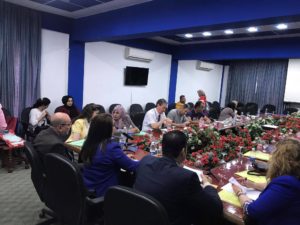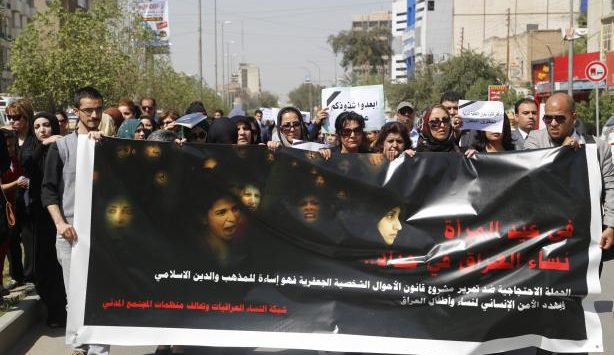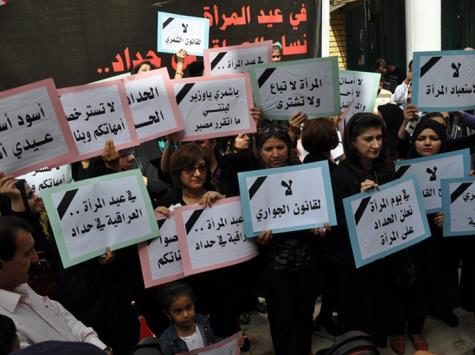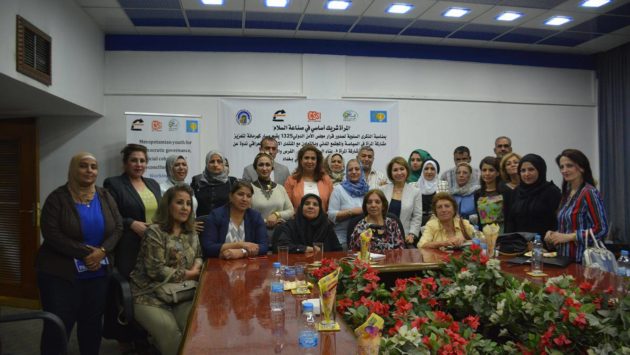Freedom of Expression and Access to Information: The Iraqi Women Journalists Forum Works to Promote Essential Rights
The Iraqi Women Journalists Forum (IWJF) organized a legal seminar as a part of the Shahrazad project on Saturday, 15 July. The seminar centered on the most recent drafts of two laws now being discussed in parliament: the Right of Access to Information law and the Freedom of Expression and Peaceful Demonstration law. The seminar drew attention to the fact that, despite their names, if passed in their current forms, these drafts laws threaten to stifle the vey rights and freedoms they claim to protect. The seminar was attended by a group of politicians (including an advisor to the Minister of Foreign Affairs), journalists, activists, and representatives of civil society organizations.
The first part of the seminar focused on a discussion of the Right of Access to Information law.
Mr. Adnan Al-Sarraj, head of the Iraqi Center for Media Development, presented his paper, which stressed the need to pass a law which ensures all Iraqis access to information. Until now, Iraq has had no law protecting this important right in its constitution. The omission is especially glaring given the prevalence of international conventions which stipulate the right of citizens to access information about their government, its institutions, and the processes by which policies are made and implemented. (For an overview of the issue itself as well as some of the laws and conventions now in place, see: http://www.right2info.org/). The absence of this kind of explicit safeguard is harmful to citizens, scientific researchers, and, perhaps most obviously, to the media whose role is to disseminate information to the people.
“The Right of Access to Information law is one of the most important tools citizens have to ensure the openness and transparency of their government and its institutions, and it plays a role in the promotion and protection of democracy,” said the president of the Iraqi Center for Media Development. And indeed, we find that many countries — for instance, Morocco, Egypt, the Netherlands, Poland and a number of Eastern European countries — have already moved to adopt this kind of law.
Dr. Bushra al-Obeidi, legal advisor of IWJF, offered some further observations on the proposed law. With Mr. Al-Sarrai, she stressed the need to provide information to Iraqi researchers in all fields, who, despite the importance of their work to the country, and their role in ensuring the smooth operation of its institutions, are often denied access to the data they most need. Al-Obeidi added that “we should guarantee researchers the facilities, the resources and the guidance they require to advance their work.”
Her analysis went further, drawing parallels between this Iraqi draft law and another already in place in the Kurdistan region. She confirmed that there is much in common between the two, however, the current law in the Kurdistan region gives access to information only to citizens in Kurdistan, while the draft law in the Iraqi parliament extends this right to all Iraqis (Kurds and non-Kurds alike).
The expanded access to information offered by the new Iraqi draft law is undoubtedly a positive step. But it is undermined by an article included in the law which would increase punishment for those who use information in a way that “adversely affects the country.” Just who decides what ‘adverse’ means in this context is not clear, and thus the article threatens to become an instrument of oppression rather than freedom. Voices and research deemed to be “adverse to the country” might be deliberately silenced by those in power, if seen as a challenge to the status quo.
The second part of the seminar discussed the draft of the Freedom of Expression and Peaceful Demonstration law:
The jurist, Firas al-Khazali, opened the discussion saying that no one should be able to prevent citizens from exercising their right to free expression, and that if a citizen commits a violation of public order, authorities should be entitled to use only appropriate sanctions against him. Furthermore, these sanctions must be publicly accepted, and carefully monitored and regulated in order to prevent them from being abused.
Despite the need to check government power, the seminar also highlighted the need to cooperate and collaborate. ”We must use the language of negotiation, and not make the government an adversary,” said Nabras al-Mamouri, president of IWJF. She then added that “we need to review the proposed amendments of the draft laws and bring our review before the parliament and the government.” Civil society and the government can be allies in creating a strong and just Iraq.
The attendees agreed to press the parliament and other concerned parties to delay the passing of theses draft laws until next parliamentary session.
We should note here that during their session on 24 July, the Iraqi parliament attempted to vote on the both of the drafts. Fortunately, no agreement was reached on either draft, and the voting has been postponed until another time, which has not yet been determined.
This legal seminar is part of the second season of the Shahrazad project in cooperation with Un Ponte Per… and ICSSI, with additional funding from the Federal Republic of Germany and the Swiss Foundation FAI.





